|
|
|
Sort Order |
|
|
|
Items / Page
|
|
|
|
|
|
|
| Srl | Item |
| 1 |
ID:
137503
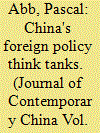

|
|
|
|
|
| Summary/Abstract |
This article provides an overview of activities by Chinese foreign policy think tanks, with a particular focus on developments over the last decade. Covering a sample of prominent institutes, it provides up-to-date information about their academic, advisory and PR functions, and highlights major differences between individual institutes and organizational groups. In line with the findings, I argue that Chinese think tanks have undergone a remarkable increase and professionalization in their academic work, as well as made big strides in improving their footprint in the media. Finally, the article also considers new developments in networking organizations that have been particularly important in bringing experts together to pursue mutual interests, and how these relate to changes in Beijing's international agenda.
|
|
|
|
|
|
|
|
|
|
|
|
|
|
|
|
| 2 |
ID:
137502
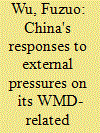

|
|
|
|
|
| Summary/Abstract |
China, although a member of most of the international non-proliferation and multilateral export control regimes and having a law-based comprehensive export control system, has not fully complied with its non-proliferation obligations, which is evidenced by not only the US's sanctions on some Chinese entities for their weapons of mass destruction (WMD) related exports but also some external disclosures in this regard. Faced with these external pressures, China's responses have been both reactive and proactive. The rationale for China's mixed responses can be attributed to its security interest in preventing nuclear terrorism, geopolitical interests in South Asia, economic interests in procuring oil supplies, high-tech imports and missile export markets, in addition to its status interest in building a ‘responsible great power’ identity in the international community.
|
|
|
|
|
|
|
|
|
|
|
|
|
|
|
|
| 3 |
ID:
137498
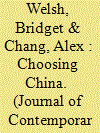

|
|
|
|
|
| Summary/Abstract |
This article examines East Asians and Chinese nationals who select ‘China as a model’ of development. The analysis looks at both macro and micro explanations to show that China's standing as a development model is not in sync with its status as a rising global and regional power. At the macro level, the focus is on country-level patterns, while the micro analysis is drawn from the third wave surveys of the Asia Barometer Survey data conducted from 2011 to 2013 in 13 different countries. The findings suggest that political values, history, geography and socio-economic conditions correspond to different views of China as a model and that those outside of China who select the country as a model are quite different from those in China itself.
|
|
|
|
|
|
|
|
|
|
|
|
|
|
|
|
| 4 |
ID:
137501
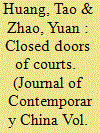

|
|
|
|
|
| Summary/Abstract |
In China, courts may refuse to accept certain legal actions involving financial matters without any solid or explicit legal grounds. An analysis of such a phenomenon should help scholars to understand the functioning logic of China's judicial power. This article suggests that there are a number of reasons behind the filtration system, including a lack of applicable legal rules, a weak ability of the courts to understand complicated financial matters, the background of the economic system transition, the political consideration of ‘maintaining social stability’ and judiciary self-interest. Filtration has inevitably had a negative effect on China's financial markets, and reform is thus necessary.
|
|
|
|
|
|
|
|
|
|
|
|
|
|
|
|
| 5 |
ID:
137500
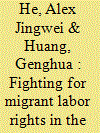

|
|
|
|
|
| Summary/Abstract |
China's dizzying economic achievement is not mirrored in its labor rights protection record. Migrant workers in particular do not enjoy rights commensurate with their contribution to the economy. The pervasive infringement of labor rights and the failure of the official protective system have jointly created a niche for nongovernmental organizations (NGOs). This article investigates the grassroots migrant labor NGOs in the Pearl River Delta region, an area which has seen unprecedented increases in labor disputes both in terms of quantity and intensity. Making extensive use of in-depth interviews and participatory observations, it examines the strategies and tactics NGOs use for survival and growth in a hostile external environment. This article reveals that administrative illegitimacy and resource shortage have been the two key challenges for grassroots NGOs; in order to survive, they have developed a series of strategies to enhance legitimacy and explore resources. In the meantime, however, antagonistic thinking still drives the government's response to grassroots organizations unless the latter can skillfully balance political ideology and actual operation. Yet, overall, most NGOs still managed to survive despite various difficulties. Reciprocity and mutual trust are of critical importance to peaceful coexistence, if not cooperation, between the state and the grassroots. The building of long-term healthy labor relations in China necessitates more liberal thinking and collaborative governance.
|
|
|
|
|
|
|
|
|
|
|
|
|
|
|
|
| 6 |
ID:
137504
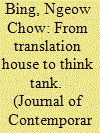

|
|
|
|
|
| Summary/Abstract |
The Central Compilation and Translation Bureau (CCTB), a key research organ of the Chinese Communist Party, has received little attention from scholars inside or outside of China. Originally an authoritative translation house for classical Marxist works, in recent years CCTB has gained more prominence as a policy think tank. Among its leaders are well-known advocates for political reforms and democracy. This article examines the institutional evolution of CCTB. It will discuss what factors are involved in how CCTB has evolved, including the role of its leadership and the changing political context in China; and it will examine how CCTB reconciles its seemingly contradictory roles of being a Marxist translation house and a pro-reform think tank.
|
|
|
|
|
|
|
|
|
|
|
|
|
|
|
|
| 7 |
ID:
137495


|
|
|
|
|
| Summary/Abstract |
Its newly acquired status as the world's second largest economy has entitled China to a more prominent role in global affairs, and increasingly, its behavior has drawn scrutiny from the world in ways that the country is ill-prepared for. The attention to China's rise, however, focuses not only on its economy but also on other aspects, including its military, diplomatic moves, domestic politics and its ‘soft power’, namely, its own image or self-projection and the world's perception or attitudes toward China. And yet, there has been no systematic investigation to evaluate how the world views a rising China. In this article, the authors applied the latest dataset from the Asian Barometer Survey to investigate whether East Asians recognize and welcome the rise of China. The findings suggest that geographical and cultural proximity have a great impact on people's perception of China. Countries which are territorially adjacent or culturally close to China tend to regard China as the most influential country in Asia. With the exception of Japan and Mongolia, most Asian countries hold positive views about the impact of China on the region. However, such benign evaluations are weaker in countries which have potential security conflicts with China, such as Taiwan and South Korea, when only the bilateral impact is considered. The overall picture shows that the rise of China has been largely recognized and welcomed by East Asians, despite some apprehension about China's strategic intentions to its neighboring countries.
|
|
|
|
|
|
|
|
|
|
|
|
|
|
|
|
| 8 |
ID:
137496
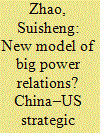

|
|
|
|
|
| Summary/Abstract |
Exploring the causes of the China–US strategic rivalry and its possible mitigation, this article argues that President Xi's new model of big power relations represents a challenge to the US primacy in the Asia–Pacific based on China's rising power and deeply rooted suspicion of the US containment. But neither the US nor China can be the single dominant power in the region. The new model can be built only if China and the US demonstrate a strategic restraint and maintain a delicate balance of power to prevent their rivalry from boiling over into a new Cold War.
|
|
|
|
|
|
|
|
|
|
|
|
|
|
|
|
| 9 |
ID:
137499
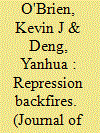

|
|
|
|
|
| Summary/Abstract |
In spring 2005, villagers in Dongyang County, Zhejiang were unhappy. For four years they had been complaining about pollution emitted by 13 factories located in the Zhuxi Chemical Park, but nothing had been done. So they set up a tent encampment to block delivery of supplies to the factories. At first, they employed restrained tactics, including going about daily life in the tents, badgering cadres sent to demobilize them, and kowtowing. After a harsh repression produced hundreds of injuries and left dozens of damaged vehicles and other evidence of police action strewn about, the tent-sitters switched to more aggressive tactics, including denouncing local leaders, carrying out mock funerals, interrogating factory owners and ransacking the homes of ‘traitors’. The authorities' ill-considered and poorly-timed repression led to tactical escalation, helped draw thousands of people to the scene, and ultimately resulted in the chemical park being closed. This episode speaks to the ‘dissent–repression nexus’ and suggests that repression can be counterproductive when it encourages protesters to ratchet up their tactics and a ‘protest spectacle’ ensues. In today's China, striking displays and theatrical performances, especially in the wake of a crackdown, can attract an audience, bring in financial support and create a carnival-like atmosphere in which popular acclaim, the breakdown of social order and the inversion of power hierarchies grants protesters leverage and induces the authorities to make concessions.
|
|
|
|
|
|
|
|
|
|
|
|
|
|
|
|
| 10 |
ID:
137497


|
|
|
|
|
| Summary/Abstract |
This article identifies the explanatory sources of Asians' perceptions about China's rise. The authors try to decipher the relative importance of individual-level explanatory variables such as socio-economic satisfaction, cognitive schema, and ideology and political values vis-à-vis that of the country-level structural variables such as geopolitical tension, economic interdependence and cultural identity. The empirical findings suggest that the growing perception that China has the most influence in Asia is more related to individual-level demographic variables which are associated with greater interest in political affairs, despite the fact that there is also some evidence that contextual factors related to economic interdependence also matter. A favorable perception of China's influence, on the other hand, is more associated with a less negative orientation on geopolitical and cultural factors, which both involve long-term historical memory and political feelings. Economic interdependence might engender adversarial feelings against China if the level of interdependence is high enough to cause economic vulnerability.
|
|
|
|
|
|
|
|
|
|
|
|
|
|
|
|
|
|
|
|
|